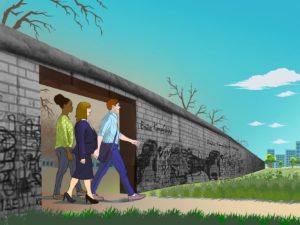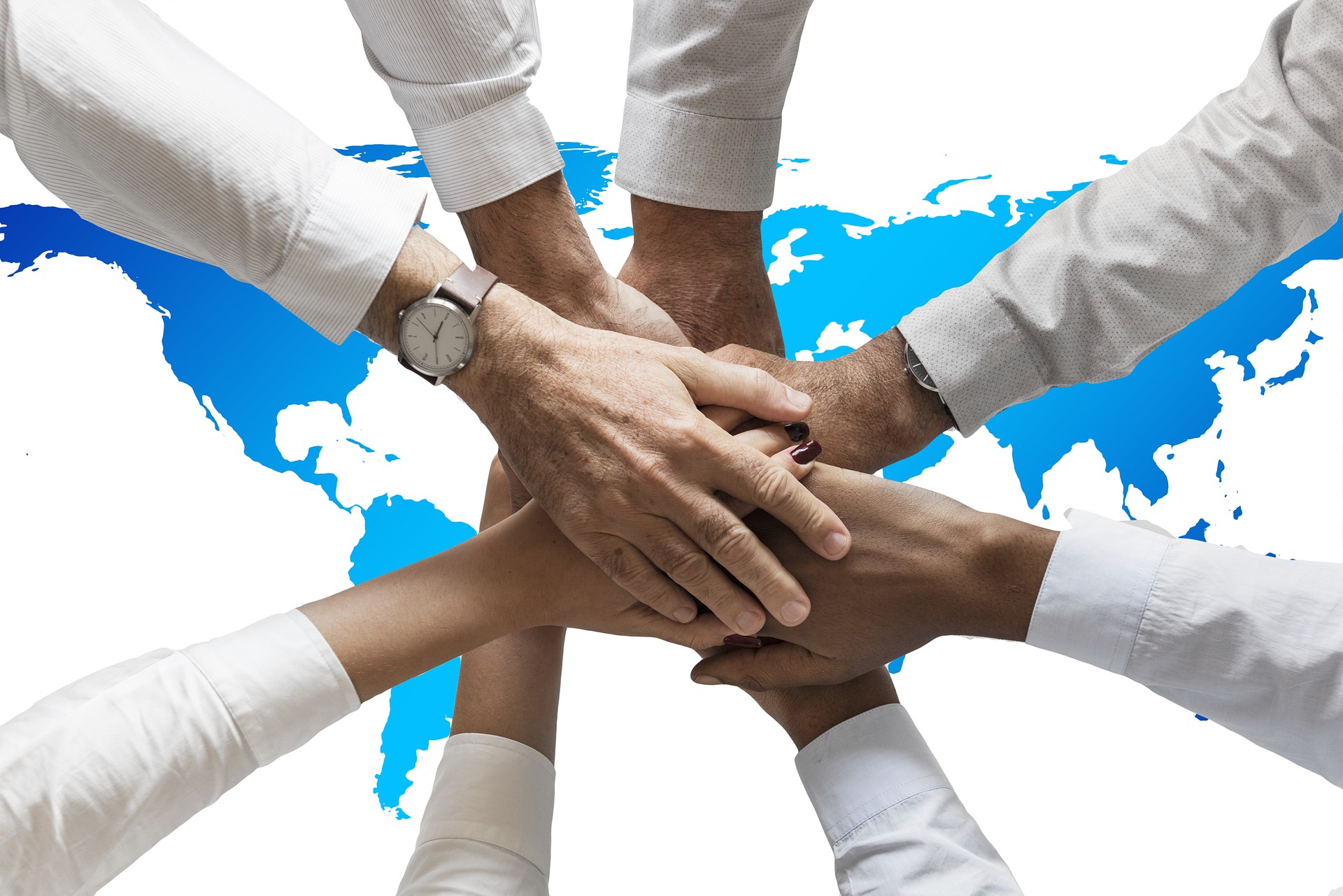Langeweile – von wegen, es geht um Leben und Tod – die Globalisierung im Recht – von Josefine Antonia Schulte, Studentin Rechtswissenschaften, Berlin/Frankfurt – “Wer nicht fragt, bleibt dumm!”
Heutzutage sprechen wir alle ständig von der Globalisierung, ihren Folgen und Vor/- Nachteilen. Was bedeutet das eigentlich? Besonders auf Rechtsfragen bezogen, eröffnen sich durch oder seit der Globalisierung viele neue Ebenen, die nicht nur kompliziert erscheinen. Im Rahmen des Projekts ABOWI „Across Borders With Information“ fragt Josefine Antonia Schulte, Studentin der Rechtswissenschaften aus Berlin, Rechtsanwälte aus 197 Ländern dieser Welt wichtige Fragen – als virtuelle Reise durch das Recht dieser Welt.
Einfach per Telefon oder Videokonferenz

Ein Brief vor hundertfünfzig Jahren reiste mehrere Wochen von New York nach Norddeutschland per Schiff, teuer und kompliziert. Vor 100 Jahren wäre die Informationszustellung durch den Flugverkehr innerhalb einer Woche möglich gewesen. Vor fünfzig Jahren reiste die Information per Transatlantischen Telefonkabel von Emden (Ostfriesland, Deutschland) nach Coney Island (New York, USA) in wenigen Minuten, deutlich schneller, und unkomplizierter aber immer noch teuer.
Seit der Erfindung des Internets ist die Informationsreise rasant geworden. 2018 verlegten US-Konzerne Facebook und Microsoft ein Transatlantikkabel mit dem Namen Marea aus Virginia, USA nach Bilbao, Spanien. Ein so leistungsstarkes Kabel, das unter anderem das gleichzeitige Streamen von 71 Millionen HD-Videos erlaubt. Damit ist unsere Informationsreise in kürzer als einer Sekunde erreichbar und ermöglicht live Videokonferenzen in HD-Qualität. Die ergebenden Möglichkeiten sind unermesslich mit weltweitem Austausch fast ohne Grenzen. ABOWI möchte wissen, was diese technologische Entwicklung und Innovation mit der Idee des Rechts und der Gerechtigkeit macht?
Globalisierung
Der Begriff Globalisierung lässt sich zurückführen auf den lateinischen Begriff ,,Globus“, ,,Global“, ,,die ganze Erde oder Welt betreffend“ und ist seit den 1960er Jahren im Gebrauch. Häufig definiert als zunehmende Vernetzung unserer Welt in verschiedenen Gebieten. Die Globalisierung als Teilgebiet einzugrenzen ist nicht möglich, da sie beinahe jeden Teil unseres ,,modernen Lebens“ beeinflusst. Weltweiter Handel, weltweite Beziehungen bedeuten auch die Frage nach der weltweiten Gerechtigkeit und der Rechtssystemen. ABOWI fragt nach und sucht Antworten!
Recht und Globalisierung
Die Internationalisierung und Globalisierung des Rechtes sind nicht nur ein hohles Wort, sondern betrifft das Schicksal der Menschen besonders. Was ist denn mit jemanden, der im Liebestaumel eben im Urlaub einem Einheimischen auf Capri, Italien, der als charmanter Bademeister auftrat, Geld geliehen hat. Wie soll dieses Opfer ihr Geld wiederbekommen, wenn die Sprache und das Recht System ganz anders sind? Genauso könnte ein Landwirt betroffen sein, der bei einem Arbeitsunfall sein Bein verloren hat und in Kampala, Uganda operiert wird, eine passende Prothese benötigt. Durch die Rechtsglobalisierung ist die Beinprothese, mittels eines eigenen völkerrechtlichen Vertrages weltweit anerkannt und verfügbar geworden. Diese rechtliche Zusammenarbeit der verschiedenen Staaten lässt sich auch an der Kollaboration zur Entwicklung des Covid-19 Impfstoffes gegen eine Pandemie, die sich wegen der Globalisierung ausgebreitet hat, beobachten.
Kultureller Austausch – Informationen – Gerechtigkeit
Globalisierung bedeutet auch kultureller Austausch, das offene diskutieren über Rechte und Ideen, über den Umgang mit der Gerechtigkeit. Das Ziel ist die Stärkung der Idee der Völkerfreundschaft, weil ausschließlich ein Handeln und ein friedliches Miteinander möglich wird, wenn Verlass ist, dass im Falle der Krise auch eine Instanz für Gerechtigkeit sorgt.

Die Globalisierung als Prozess wirft in der Rechtswissenschaft und unserer aller wirkendes Rechts schwierige Fragen auf. Beeinflusst durch die zunehmenden weltweiten Verflechtungen, wie internationale Vertragsschließungen z.B. Online-Shopping bei einer amerikanischen Boutique, Immobilienerwerb in Südafrika, die Immigration nach Japan oder auch der Investitionsschutz. Die Frage ist doch, wer möchte in ein Land, eine Idee, einem Projekt investieren, in dem seine Investition Unsicherheiten aufwirft? Doch wer bestimmt eigentlich das geltende Recht bei ausländischen Verträgen? Besonders im Zivilrecht existiert kaum internationales Recht, was aus dem Völkerrecht bekannt ist. Welches Gericht ist bei internationalen Streitigkeiten zuständig? Das sind nur einige von vielen Fragen, die durch die wachsende Globalisierung präsenter werden.
Der internationale Rechtsmarkt
Durch die Globalisierung entwickelte sich nach und nach ein pulsierender internationaler Rechtsmarkt. Doch wie gestaltet sich der internationale Rechtsmarkt? Wann lohnt eine Schwerpunktwahl im internationalen Recht? Was ist die internationale Rechtssprache? Wie beeinflusst die Globalisierung die tagtägliche Arbeit mit Mandanten über Grenzen hinweg? Und welche Erfahrungen machen Rechtsanwälte in und auf dem internationalen Rechtsmarkt?
Als Jura Studentin bin ich auf der Suche nach Antworten und frage nach bei Anwälten aus 197 Ländern unserer Erde mit dem Ziel Antworten auf die zahlreichen ungeklärten Fragen zu finden, die den globalen Lebensalltag mit allen Facetten betreffen.
„Der Einfachheit halber wird im gesamten Text die männliche Form verwendet; die […] weibliche Form ist selbstverständlich eingeschlossen“.
V.i.S.d.P.:
stud. iur. Josefine Antonia Schulte
josefine.schulte@dr-schulte.de
Durchwahl: 030-221922040
Über ABOWI:
Across Borders With Information – ABOWI, eine Interviewreihe von Josefine Schulte Jurastudentin aus Berlin in Deutschland. Fragen und Antworten: Eine Reise um die Welt, die Unterschiede und Vorurteile aufdeckt. Was bewegt die Anwälte dieser Erde, Josefine Schulte fragt sich von Aserbaidschan bis Zypern durch.
Englische Übersetzung:
ABOWI: Thirst for knowledge – how to get suitable answers with questions?
Boredom – my ass, it’s a matter of life and death – the globalization in law – by Josefine Antonia Schulte, student of law, Berlin/Frankfurt – „He who does not ask, remains stupid!
Nowadays, we all constantly talk about globalization, its consequences and advantages/disadvantages. What does that actually mean? Especially with regard to legal questions, many new levels are opening up through or since globalization, which not only seem complicated. Within the project ABOWI „Across Borders With Information“ Josefine Antonia Schulte, student of law from Berlin, asks lawyers from 197 countries of this world important questions – as a virtual journey through the law of this world.
Simply by telephone or video conference

A letter one hundred and fifty years ago traveled several weeks from New York to Northern Germany by ship, expensive and complicated. A hundred years ago, information delivery by air would have been possible within a week. Fifty years ago, information traveled by transatlantic telephone cable from Emden (East Frisia, Germany) to Coney Island (New York, USA) in a few minutes, much faster, and less complicated but still expensive. Since the invention of the Internet, the information journey has become rapid. In 2018, US corporations Facebook and Microsoft laid a transatlantic cable called Marea from Virginia, USA to Bilbao, Spain. Such a powerful cable, which among other things allows the simultaneous streaming of 71 million HD videos. This means that our information journey can be reached in less than a second and enables live video conferences in HD quality. The resulting possibilities are immeasurable with worldwide exchange almost without limits. ABOWI would like to know what this technological development and innovation does to the idea of law and justice?
Globalization
The term globalization can be traced back to the Latin terms „globe“, „global“, „concerning the whole earth or world“ and has been in use since the 1960s. It is often defined as the increasing interconnectedness of our world in different areas. It is not possible to limit globalization as a sub-area, as it influences almost every part of our „modern life“. Worldwide trade, worldwide relations also mean the question of worldwide justice and legal systems. ABOWI asks and seeks answers!
Law and Globalization
The internationalization and globalization of law is not just a hollow word, but particularly affects the fate of people. What about someone who, in a frenzy of love, lent money on vacation to a local on Capri, Italy, who was a charming lifeguard. How is this victim supposed to get her money back, when the language and the legal system are completely different? The same could be true for a farmer who has lost his leg in an industrial accident and needs a suitable prosthesis in Kampala, Uganda. Due to the globalization of the law, the prosthetic leg has become recognized and available worldwide through a separate international treaty. This legal cooperation of the different states can also be seen in the collaboration for the development of the Covid-19 vaccine against a pandemic that has spread due to globalization.
Cultural exchange – Information – Justice

Globalization also means cultural exchange, open discussion about rights and ideas, about how to deal with justice. The goal is to strengthen the idea of friendship among nations, because only action and peaceful coexistence is possible when it can be relied upon that in the case of a crisis an authority will also provide justice.
Globalization as a process raises difficult questions in jurisprudence and in the law we all practice. Influenced by the increasing worldwide interdependencies, such as the conclusion of international contracts, e.g. online shopping at an American boutique, the acquisition of real estate in South Africa, immigration to Japan or investment protection. The question is, who wants to invest in a country, an idea, a project, in which his investment raises uncertainties? But who actually determines the applicable law for foreign contracts? Especially in civil law there is hardly any international law, which is known from international law. Which court is competent in international disputes? These are just a few of the many questions that are becoming more and more present due to growing globalization.
The international legal market
Due to globalization, a pulsating international legal market has gradually developed. But how is the international legal market structured? When is it worth choosing a focus on international law? What is the international legal language? How does globalization influence the daily work with clients across borders? And what experiences do lawyers make in and on the international legal market?
As a law student, I am looking for answers and ask lawyers from 197 countries around the world with the aim of finding answers to the numerous unanswered questions that affect all facets of everyday life in the global arena.
„For the sake of simplicity, the masculine form is used throughout the text; the […] feminine form is of course included“.
V.i.S.d.P:
Stud. iur. Josefine Antonia Schulte
josefine.schulte@dr-schulte.de
Extension: 030-221922040
About ABOWI:
Across Borders With Information – ABOWI, a interview row of Josefine trained law student from Berlin in Germany. Questions and answers: A journey around the world, which uncovers differences and prejudices. What moves the lawyers of this world? Josefine Schulte asks herself from Azerbaijan to Cyprus.
Kontakt / Contact us:
Dr. Schulte Lawyer
Malteserstrasse 170
12277 Berlin
Phone: +49 30 22 19 220 20
fax. +49 30 22 19 220 21
Email: dr.schulte@dr-schulte.de
Pressekontakt / Press contact:
Dr. Schulte attorney
Malteserstrasse 170
12277 Berlin
Phone: +49 30 22 19 220 20
fax. +49 30 22 19 220 21
Email: dr.schulte@dr-schulte.de


